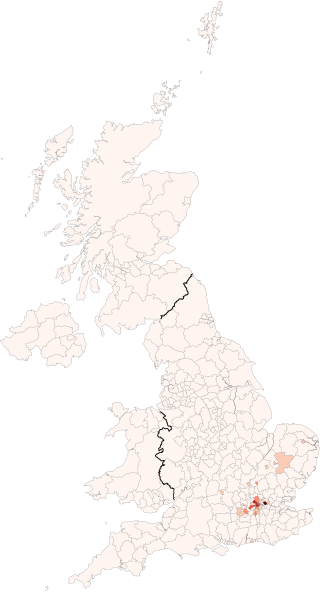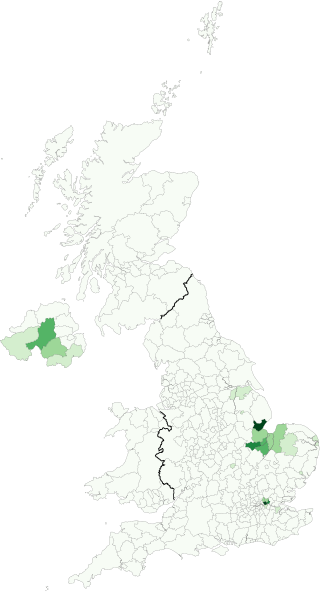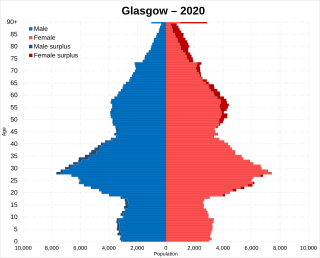
British Chinese, also known as Chinese British or Chinese Britons, are people of Chinese – particularly Han Chinese – ancestry who reside in the United Kingdom, constituting the second-largest group of Overseas Chinese in Western Europe after France.
Germans in the United Kingdom form one of the largest minority groups in the country. Today, there are many Germans living in the United Kingdom, and many Britons or German British have German ancestry, including the British royal family. While those born in Germany constitute one of the UK's largest foreign-born groups, many are British nationals, rather than German nationals, who were born in Germany to British military personnel based there.

French migration to the United Kingdom is a phenomenon that has occurred at various points in history. The Norman Conquest of England by William the Conqueror in 1066 resulted in the arrival of Normans, while in the 16th and 17th centuries Protestant Huguenots fled religious persecution to East London. Other waves are associated with monasticism, particularly post-conquest Benedictines and Cistercians, aristocracy fleeing the French Revolution, expulsion of religious orders by Third Republic France, and current expats.

Filipinos in the United Kingdom are British citizens or immigrants who are of Filipino ancestry.

Spaniards in the United Kingdom are people of Spanish descent resident in Britain. They may be British citizens or non-citizen immigrants.
Koreans in the United Kingdom include Korean-born migrants to the United Kingdom and their British-born descendants tracing ancestries from North Korea and South Korea.
British Iraqis are British citizens who originate from Iraq.
Kenyan migration to the United Kingdom has been occurring for many decades. As a result, many people in the UK were born in Kenya, or have Kenyan ancestry. Many Kenyan people who migrated to the UK are of South Asian extraction.

South Africans in the United Kingdom include citizens and residents of the United Kingdom with origins in South Africa.
Canadians in the United Kingdom, or Canadian Britons, are people from Canada living in the United Kingdom and their descendants. In 2001 some 72,518 people born in Canada were living in the UK according to the UK census. Of the ten census tracts with the highest Canadian-born populations, nine were in London, with the other being Cambridge West. The Office for National Statistics estimates that, in 2009, 82,000 Canadian-born people were living in the UK. In 2011 this was the third largest community in the Canadian diaspora after Canadians in the United States and Canadians in Hong Kong.

Singaporeans in the United Kingdom may refer to people who have full or partial Singaporean origin or descent, born or settled in the United Kingdom, or Singaporeans in Britain which are high-income expatriate professionals as well as skilled workers, with many still maintaining close ties with Singapore, especially those who continue to retain Singaporean citizenship while having permanent residency in Britain, as well as students.
Malaysians in the United Kingdom are British citizens who have full or partial Malaysian origin or descent and Malaysian citizens residing in the United Kingdom. The 2001 UK Census recorded 49,886 Malaysian-born people. The 2011 census recorded 62,396 people born in Malaysia living in England, 2,117 in Wales, 4,721 in Scotland and 705 in Northern Ireland. The largest concentrations of Malaysian-born residents were recorded in Greater London and South East England (11,331). The Office for National Statistics estimates that 75,000 Malaysian-born expatriates were residents in the UK in 2017.
Dutch people in the United Kingdom, also known as Anglo-Dutch people, include British people of Dutch ancestry and people born in the Netherlands who live in the United Kingdom. The 2001 UK Census recorded 40,438 Dutch-born people living in the UK. More recent estimates by the Office for National Statistics put the figure at 56,000 in 2013. The 2011 Census recorded 57,439 Dutch-born residents in England, 1,642 in Wales, 4,117 in Scotland and 515 in Northern Ireland.
Czechs in the United Kingdom refers to the phenomenon of Czech people migrating to the United Kingdom from the Czech Republic or from the political entities that preceded it, such as Czechoslovakia. There are some people in the UK who were either born in the Czech lands or have Czech ancestry, some of whom descended from Jewish refugees who arrived during World War II.

New Zealanders in the United Kingdom are citizens or residents of the United Kingdom who originate from New Zealand.
Hong Kongers in the United Kingdom are people from Hong Kong who are residing in the United Kingdom or British nationals of Hong Kong origin or descent.

Lithuanians in the United Kingdom include individuals born in Lithuania who have migrated to the UK, among them Lithuanian citizens of Russian descent and Polish Lithuanian citizens, as well as their British-born descendants. The 2011 UK Census recorded 95,730 Lithuanian-born residents in England, 1,353 in Wales, 4,287 in Scotland, and 7,341 in Northern Ireland. The previous, 2001 UK Census, had recorded 4,363 Lithuanian-born residents. The Office for National Statistics estimates that 144,000 Lithuanian-born immigrants were resident in the UK in 2013.
Southeast Asians living in the United Kingdom have been present in the country for several centuries, arriving from Southeast Asia, and primarily originating from countries and territories such as the Philippines, Malaysia, Indonesia, Burma, Singapore, Thailand and Vietnam.

Glasgow is the most populous city in Scotland and the fourth most populous city in the United Kingdom.
Central Asians in the United Kingdom are Central Asians living in the United Kingdom. They have been present in the country since the 21st century and primarily originate from the countries Kazakhstan, Kyrgyzstan, Tajikistan, Turkmenistan, and Uzbekistan.








